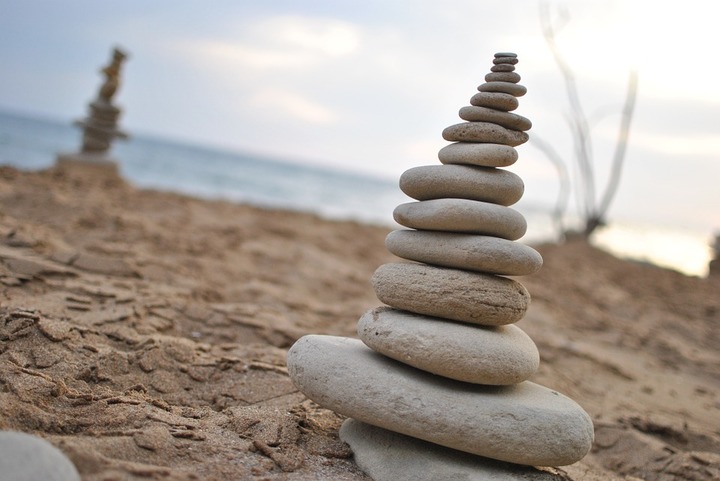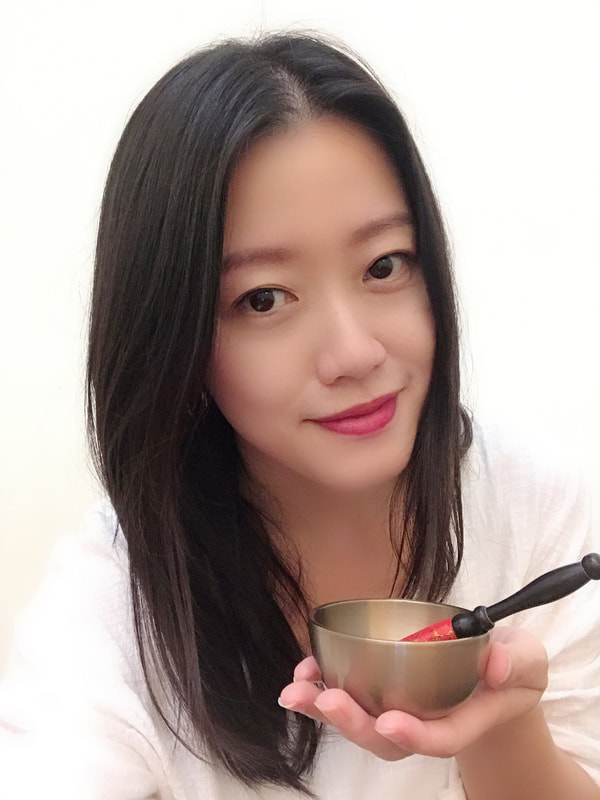|
In The Mindful People Series, we interview people from different walks of life and get them to share their mindfulness experience, as well as how learning and practicing mindfulness have made a difference to their personal and professional lives. MiMo: How did you get into learning and practicing mindfulness? May: I got to know a bit about mindfulness when I was taking a positive psychology course from The School of Positive Psychology in 2015. I started reading books like ‘The How of Happiness’ by Sonja Lyubomirsky and ‘Positivity’ by Barbara Fredrickson which links mindfulness with happiness and positivity. It sparked my interest in wanting to know more and how I could practice it. I found a book online and it caught my attention so I ordered it. It is called ‘Sitting Still Like a Frog – Mindfulness Exercises for Kids’. I wanted to try it out myself by starting with something simple. I then started searching for a more formal course which could guide me better so that one day, I can instil mindfulness into the younger generations. MiMo: Tell us about your experience in the MBSR program. May: The whole experience has been very enriching. The home practices motivated me to keep to a regular schedule of practicing mindfulness. I also learnt about how I can incorporate mindfulness into my daily life. I realized that when we practice mindfulness, it is not about relaxing or emptying the mind but is a way of noticing our thoughts and emotions without engaging or judging them. I enjoyed the small group discussions and the one-day retreat. The one phrase that I will always remember from Erin’s class is ‘The Time is Now’. MiMo: How has mindfulness contributed to your personal well-being? May: I used to be preoccupied with a lot of thoughts and worries. Now I am more aware of my thoughts and know how to let go of them. My mind is free to enjoy more present moments. MiMo: How has mindfulness supported you in your professional work? May: As my work deals with young children and special needs children, mindfulness has helped me to stay focused and better manage my emotions and stress especially in difficult situations. I will take a mindful pause. Breathing and trying to stay non-judgmental are useful skills to have. Mindfulness gels very well with the Son-Rise program that I volunteered in, that is, being non-judgmental and being fully present in the playroom with the special needs child. When I am playing with an autistic child in his/her playroom, my mind can be easily occupied with past and future wandering thoughts especially when it comes to joining in with their repetitive behaviours for a long period. Now, I am in a better state of not engaging in any of these thoughts and to bring my attention back to the child (to be fully present in the playroom) for 2 to 4 hours. MiMo: How have you incorporated mindfulness into your daily life? May: I try to make it a regular practice with the body scan before I sleep at night, alternating with mindful movements and sitting practice. I also incorporate mindfulness in my daily auto-pilot routines such as eating my meals, walking and taking the bus rides. MiMo: Any words of advice for people who are thinking about learning mindfulness? May: Though it requires some commitment to practice mindfulness, do not be afraid to attempt and take the steps to make this change in your life. Be consistent in the practice and it will eventually be a part of your life. It will help build better relationships in your family, workplace and community. I especially recommend it for educators and parents as you play a big role in nurturing the young generations. We need to be mindful of our words and actions and not be "mind-FULL" of thoughts and judgements.  --- About Chin Tan May May obtained her Bachelor in Early Childhood Studies from Monash University in 2006 and switched her career from the IT industry to the Education industry. She has worked with voluntary welfare organisations, special needs kindergarten, enrichment centres and childcare centres. She now works part-time as a learning support teacher in a childcare centre where she helps mild special needs children integrate into their preschool life. She also provides private learning support service to children with learning difficulties in particular dyslexic children. She is an active Son-Rise volunteer, contributing her time to 2 families who are using the Son-Rise home-based program to help their autistic children. In her quest for more knowledge to help young children and their families, she is currently working towards being a certified Goulding SleepTalk consultant. Are you a mindfulness practitioner or do you know one who would like to share their mindfulness experience on the MiMo blog? Do drop us a message!
0 Comments
Mindful Moments will be participating in the Green Bazaar at KK Women's and Children's Hospital!
Date: Wednesday 16 November Venue: KK Women's and Children's Hospital, 100 Bukit Timah Road, Singapore 229899 Location: Children's Tower Level 1 Cost: Free Visit our information booth between 10 am - 4 pm to get a free consultation or chat with Mindfulness Coach Erin, and ask her questions about mindfulness training. Erin will also be conducting a workshop - Introduction to Practical Mindfulness - during the lunch hour (12 pm - 1 pm) at the Training Room. Members of the public can walk in and register. See you there! Mindful Moments conducted two introductory workshops over the months of September and October 2016 for the graduate students at the National University of Singapore (NUS) UTown Residences. The participants learned the importance of living in the present moment, as well as how to more effectively manage their stress levels. The mindfulness skills they picked up will certainly come in handy in times of stress and difficulties! Are you an organization looking to organize a mindfulness training workshop for your colleagues or employees, do contact Erin to discuss possibilities!
We are also able to bring the classic research-based 8-Week Mindfulness-Based Stress Reduction (MBSR) program to your workplace or community. [More details here] In The Mindful People Series, we interview people from different walks of life and get them to share their mindfulness experience, as well as how learning and practicing mindfulness have made a difference to their personal and professional lives. MiMo: How did you get into learning and practicing mindfulness? OCY: I knew about meditation way back but the very first time I got to know about mindfulness was when Erin and I had a discussion about Vipassana Meditation. MiMo: Tell us about your experience in the MBSR program. OCY: I enrolled in the MBSR program in August 2015 in Singapore. The 8-week program was fulfilling and experiential. I could put all the teachings and principles of mindfulness into action and apply them in my daily practice. The biggest challenge was to commit to a scheduled slot of time every day for mindfulness practice - without giving myself any convenient excuses! MiMo: How has mindfulness contributed to your personal well-being? OCY: I feel my personal well-being has improved tremendously since I began practicing mindfulness from moment to moment in my everyday life. I feel more grounded in the here and now, rather than worry too much about the future and regret the things I've done or have not achieved in the past. Whenever I get anxious, I will just try to stop thinking negatively and start breathing. Breathing in and I know I am breathing in. Breathing out and I know I am breathing out. When I am paying attention to my breath, I am able to keep my mind calm to work with the challenges I encounter in life. MiMo: How has mindfulness supported you in your professional work? OCY: As an educator and coach, mindfulness has helped me manage my level of stress in education management as well as more effectively coach my core team in 1-to-1 digital teaching and learning - a relatively new area of curriculum integration which many teachers are still getting used to. I practice deep, mindful listening when I have dialogues with my colleagues and the young learners in school; I find that I am more compassionate when dealing with the problems or difficult situations that my team members have to face; and most importantly, I am always aware of my emotions and energy in different work scenarios - this has been especially helpful for me in managing my stress levels. MiMo: How have you incorporated mindfulness into your daily life? OCY: I meditate and do the body scan practice twice a day, and I schedule a mindful swim of about 20 minutes every day. Whenever I am walking, I will remind myself to walk mindfully - Singaporeans tend to walk quite fast due to our more stressful pace of life, and I have found that it takes practice to remain mindful when we are walking at a faster speed! MiMo: Any words of advice for people who are thinking about learning mindfulness? OCY: Mindfulness is a liberation of the soul and a lifelong skill that every human being should acquire. It will help you discover your true authentic self, I promise. And I personally feel that mindfulness training is much needed in the education field, especially for our teachers, because of the heavy responsibilities we have in nurturing the future generations of Singapore. I believe that only mindful teachers can nurture and develop mindful learners. I strongly encourage teachers, principals and even students to learn and practice mindfulness. --- About Ooi Ching Ya A former trainer at the Ministry of Education Singapore and key founding member of the School of Science and Technology Singapore (SST), Ching Ya is currently Special Advisor to the Principal at RDFZ XISHAN SCHOOL in Beijing China. As a strategic consultant who bridges the educational development between Singapore and China, Ching Ya is focusing her contributions on international relations, branding, as well as lifelong learning in global digital education. She is passionate about showcasing how technology can support the rich interactions and connections across life. In 2015, Ching Ya was selected to sit on Apple Inc's ADE Regional Advisory Board for Asia-Pacific, and is responsible for the professional development of Apple Distinguished Educators in individualized digital teaching and learning. Are you a mindfulness practitioner or do you know one who would like to share their mindfulness experience on the MiMo blog? Do drop us a message!
Mindful Moments was invited to give a sharing on mindfulness with ITE College West School of Electronics & Info-Comm Technology educators in the morning of Friday 8 January 2016. After learning about the benefits, research, and applications of mindfulness and experiencing some moments of calmness and awareness, these dedicated educators expressed interest in bringing mindfulness into the classroom to benefit their students. Erin is available to conduct mindfulness talks and programs for organisations, so please contact Erin to discuss the possibilities, because she would love to practice mindfulness with you.
 MiMo Contributor: Dawn is a passionate educator with 17 years of experience spanning the communication and education industry. Starting her career as a public prosecutor, she joined the media industry and garnered experience in writing and editing corporate reports, speeches, press releases, e-newsletters and other corporate publications. Since then, she has transitioned to being an edutainer (aspiring to educate while entertaining in doses) and lectured at various tertiary institutions. An avid learner, she has now moved into coaching and counselling and looks forward the next chapter of her journey of learning and unlearning. The Initial AssumptionsWhen I first heard about the practice of mindfulness, I was rather surprised to hear that it has gained much currency in the past few years. I was even more intrigued to discover that there were increasingly more academic disciplines offered for practitioners. After all, is mindfulness not a basic form of etiquette that we have been socialised into accepting and practising for the longest time? This was where I realised something. I confused being ‘mindful’ with the act of ‘minding’, where I use my intellect to consider, reason and ‘mind’ my business for the latter. I also associated it with keeping others around me in ‘mind’ - extending consideration to them. While all these thoughts and actions are perfectly fine and commonplace, the one aspect that I neglected about ‘mindfulness’ was how I could extend consideration to myself and how that could really help in some of my challenges. A Taste of Mindful MomentsI had absolutely no expectations when I attended the information sharing session about mindfulness conducted by Erin on 9 Jan 2016. This was useful in keeping an open mind and gleaning three key takeaways from the session. 1. Mindfulness is not tangible, but the results of practising mindfulness are. During the session, Erin invited us to participate in a short activity to fully experience the sights and senses of tasting a fruit. That felt like the longest three minutes of my life and I was ready to explode with impatience. Why should eating a fruit even be so cumbersome? Then I realised that I chose to slow down midway and not fight my urges to accelerate the simple process. Strangely, I was able to feel calmer after this activity. All that took place within me was not tangible and only known to me. But it was a poignant reminder to not be afraid to go slow and take stock of things around us. 2. It takes effort (and some pain) to be mindful: This is about taking steps to coach my mind to resist reacting with familiar means. Instead, I believe in working to modify the response. Whenever I feel the urge for something to be done immediately, I recall the song ‘Right Here, Right Now’ by Fatboy Slim. While I do enjoy the beat of the song, it never fails increase my stress levels since we live in a world when everybody demands things instantly. Hence, there is pain when I make intentional efforts to practise mindfulness and slow down. Naturally, I do not recommend applying this to time sensitive work situations but more on a personal front for a start. Nonetheless, there is immense value in practising mindfulness at work when making choices that are triggered by perceived stressors. 3. Can I afford to not be mindful? The short answer is both ‘Yes and No’ since we always have options. Having said that, I do not believe that I can afford to not be mindful. This is especially so given my personality, profession and passion for life. As an educator, communications practitioner and coach, even my best intentions for individuals will be met with challenges. Mindfulness helps me increase my empathy, full-heartedly. It also helps me to choose to reduce the tendency to internalise the problems of my clients. Most importantly, it facilitates my ability to separate thoughts from truths. This was the most precious and empowering reminder I walked away with from the session. As of now, I am fully mindful that this journey will not be easy but it will be worthwhile. If you are a mindfulness practitioner or have meaningful experiences or thoughts about mindfulness to share, please contact Erin to find out more.
There has been a rapid growth in the number of mindfulness research publications over the past three decades, suggesting that mindfulness has become more and more widely-used in clinical interventions.
We have summarized the key benefits of mindfulness and gathered in this post some of the more accessible research on the benefits of mindfulness for your reference (you can click on the embedded links to read more): Mindfulness and Anxiety
Mindfulness and Emotions
Mindfulness and Brain Change
Mindfulness and Children
Mindfulness and Educators
The classic 8-Week Mindfulness-Based Stress Reduction (MBSR) Program is one of the most established mindfulness programs taught and practiced around the world today. Do check out the latest MBSR program we are offering! |
About The AuthorMiMo founder Erin Lee is a Mindfulness Coach and MBSR Teacher at Mindful Moments, and advocate of mindfulness as the way of life. She conducts the classic 8-Week MBSR Program, as well as the 8-Week MBSR Workplace Program. Categories
All
ContributeAre you a mindfulness practitioner and have meaningful experiences or thoughts about mindfulness that you'd like to share? You can contribute an article on the MiMo blog! Please contact Erin to find out more.
Archives
June 2021
|
















 RSS Feed
RSS Feed